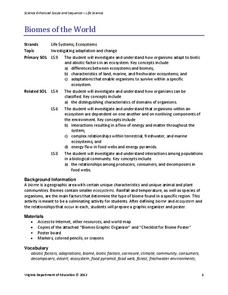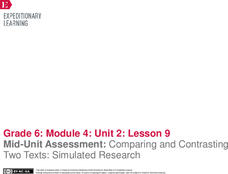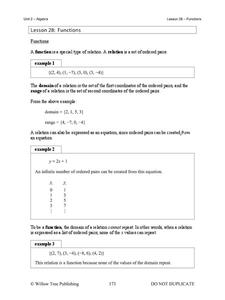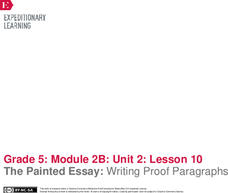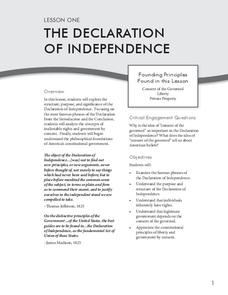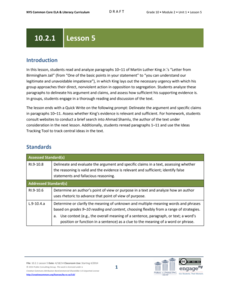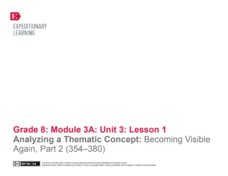Newspaper in Education
Lesson 10: Studying Content-Specific Language
Stanchion, spar, spinnaker. Right wing, sweeper, hip check. Every subject has specialized vocabulary. Here’s a fun way to introduce your learners to this jargon. Provide class groups with newspapers and have them search pre-selected...
Curated OER
Dragonwings: Explore Chapters 1-5
If you are beginning Laurence Yep's Dragonwings, this will provide activities for the first five chapters. The objectives include making connections to oneself and the world, organizing information and events, vocabulary acquisition,...
Virginia Department of Education
Biomes of the World
Incorporate knowledge about biomes and ecosystems in multiple ways while encouraging creativity. Emerging ecologists collaborate and perform research to complete a graphic organizer about various biomes of the world. They conclude the...
Virginia Department of Education
Radical Equations
Provide students with the skill for how to examine algebraic and graphical approaches to solving radical equations. Learners solve various radical equations involving square root and cube root expressions. They first solve...
EngageNY
Mid-Unit Assessment: Comparing and Contrasting Two Texts: Simulated Research
Shoo fly. Scholars read DDT Spray Scares Mosquitoes Away, Study Finds and You Think You Have It Tough? to complete a mid-unit assessment. The learners compare and contrast author presentation and conduct a credibility check on each...
Curated OER
My Secret War: The WWII Diary of Madeline Beck: Lesson 6
Fifth graders explore women's rights by discussing the events of WWII. In this American work force lesson, 5th graders identify the events that led to World War II and how women helped fight the war through non-violent efforts. Students...
Willow Tree
Functions
What makes a function a function? Learn the criteria for a relation defined as a function both numerically and graphically. Once young mathematicians define a function, they use function notation to evaluate it.
Curated OER
Old Lady That Swallowed a Fly
Youngsters listen to the story, "There Was an Old Lady Who Swallowed a Fly." After discussing the story, going over new vocabulary, and repeating the rhymes in the story, they study the parts of a fly. They finish by creating a fly on...
NY Learns
Geography of the Fertile Crescent by ECSDM
Using Google Earth, a vocabulary assignment, and map handout, your class members will outline the Fertile Crescent in Mesopotamia and identify the source of the Tigris and Euphrates rivers. They will then complete graphic organizers...
Beyond Benign
Lucky Brand Genes: Genetic Traits
Explore single-gene traits in humans. After viewing a video introducing genetic vocabulary, individuals identify their phenotype and possible genotypes of specific traits. They consider both dominant and recessive traits. This is the...
National Park Service
A Tale of Two Men
Theodore Roosevelt and the Marquis de Mores were both born in 1858, and both came to the Dakota territory in 1883, but they influenced the developing country of America in different ways. Elementary and middle schoolers apply written and...
Texas Education Agency (TEA)
Working Cooperatively in a Social System
Using an informative resource, scholars view a PowerPoint about working cooperatively in a social system. Pupils then use their newfound knowledge to create a flowchart defining the systems of an organization.
EngageNY
Introducing “If” and Noting Notices and Wonders of the First Stanza
After reading chapter 14 of the story Bud, Not Buddy by Christopher Paul Curtis, scholars take part in a read-aloud of the poem If by Rudyard Kipling and compare it to the reading of Bud, Not Buddy. Learners then go deeper into the poem...
EngageNY
Notices and Wonders of the Second Stanza of “If”
Here is an instructional activity that asks pupils to analyze poetry and sparks discussion about two different types of texts: asking how is the poem, If by Rudyard Kipling alike and different from the story, Bud, Not Buddy by...
Curated OER
Decoding Strategies
Students practice using context clues to decode the meanings of unfamiliar words. In this vocabulary skills lesson, students follow the provided instructions to complete graphic organizers that enable them to decode words in "The...
Curated OER
Vocabulary Charts
Learners create their own vocabulary charts. They divide into groups and view an example of a vocabulary chart imbedded in this plan. Then, they create their own chart which is based on a particular subject area.
EngageNY
Paraphrasing Quotes and Analyzing Visual Elements, Part 4: Investigating the Scientific Method with Max Axiom Super Scientist
Problem solved! Readers continue their work on determining gist and paraphrasing problem-solving steps by reading section four of Investigating the Scientific Method with Max Axiom Super Scientist. Learners complete a graphic organizer...
EngageNY
Building Background Knowledge: The Boy Who Invented TV, “Life before Philo”
Walk through the pictures to understand the text. Scholars analyze The Boy Who Invented TV: The Story of
Philo Farnsworth by taking a book walk and looking at the pictures. They then do a first read of Life before Philo to...
EngageNY
The Painted Essay: Writing Proof Paragraphs
Words of proof. Learners continue coding The Electric Motor by marking the first point in yellow and the second point in blue. They discuss the structure of the paragraphs by identifying transition words and evidence to support the...
Bill of Rights Institute
The Declaration of Independence
Take classes on an in-depth tour of the Declaration of Independence. An informative resource effectively scaffolds learning by providing warm-up and wrap-up activities. It also includes a variety of handouts for individuals to complete,...
EngageNY
Grade 10 ELA Module 2: Unit 1, Lesson 5
People should always choose their words carefully. Scholars examine the words used by Martin Luther King, Jr. in paragraphs 10 and 11 of his "Letter from Birmingham Jail." Readers answer questions about word use, think about synonyms,...
EngageNY
Grade 10 ELA Module 3: Unit 1, Lesson 9
Scholars examine an excerpt from The Immortal Life of Henrietta Lacks and determine how the author builds up smaller details to create the larger idea of the main passage. To finish the lesson plan, learners discuss in pairs, answer...
EngageNY
Analyzing the Model Essay: Studying Argument (Chapter 27 Plus Synthesis of Scenes in Previous Chapters)
Scholars partner up to review a model essay and talk through the process leading up to writing their essays. During a second reading of the essay, learners locate and underline the claim given, reasons, and counterclaim. They then...
EngageNY
Analyzing a Thematic Concept: Becoming Visible Again, Part 2 (354–380)
Scholars take a close look at the life of Louie in Unbroken. They discuss events considered turning points in their life and use several graphic organizers and guides to help direct their thinking. After thinking about their responses,...


